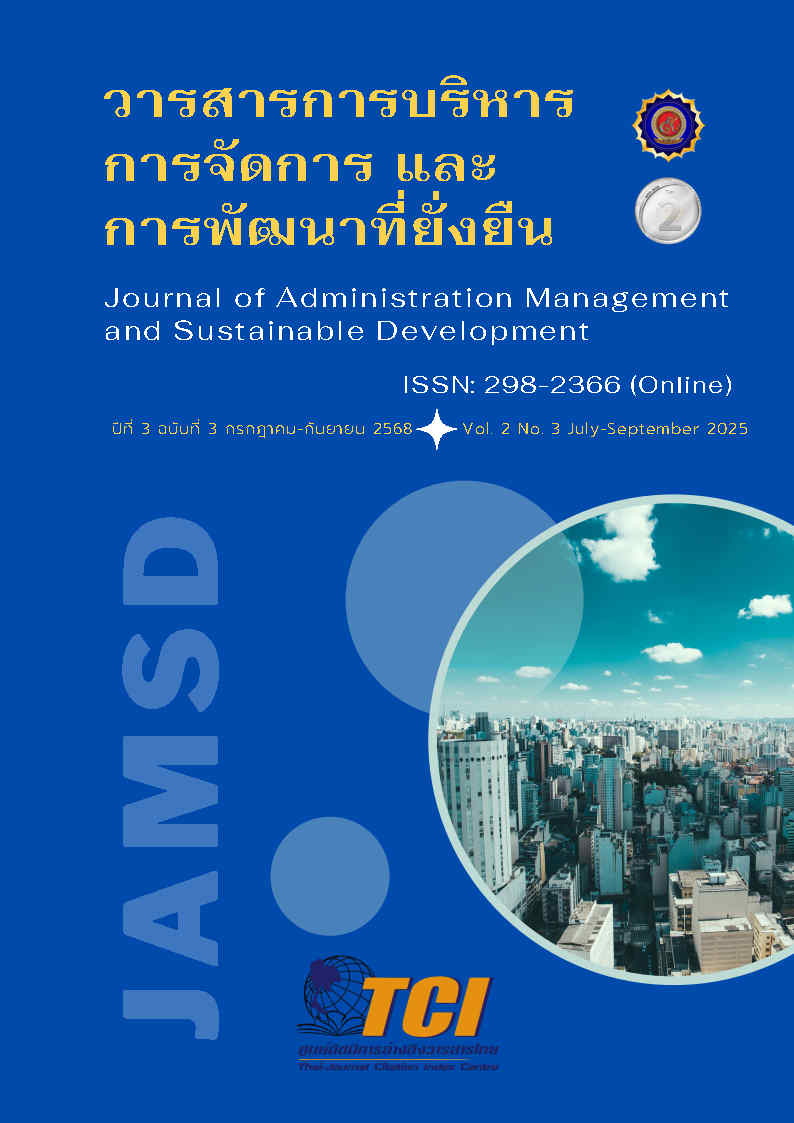The association between related-party transactions and tax planning of listed companies on the Stock Exchange of Thailand
คำสำคัญ:
tax planning, related-party transaction, tax, transfer pricingบทคัดย่อ
This study aims to examine the association between related-party transactions and tax planning among listed companies on the Stock Exchange of Thailand, following the implementation of the Act Amendment Revenue Code (No. 47). The data are collected from companies listed on the Stock Exchange of Thailand (SET Index) from 2020 to 2023. The data were analyzed using both descriptive statistics and inferential statistics, including correlation and multiple regression analysis, to examine the relationships between dependent and independent variables. The findings indicate that related-party sales (RPS) are negatively associated with tax planning when measured by the Effective Tax Rate (ETR) and the ratio of corporate income tax expense to operating cash flows (TCFO). The result indicates that an increase in related-party sales corresponds with more aggressive tax planning behavior. Tax planning frequently involves shifting earnings across borders using related-party transactions to take advantage of tax rate differentials between countries. Additionally, the results reveal that firm size positively influences tax planning behavior, measured by ETR, indicating that larger firms tend to reduce their tax planning behavior. Profitability (measured by return on assets) shows a positive relationship with TCFO, implying that firms with higher profitability exhibit lower levels of tax planning behavior. Furthermore, firm growth also demonstrates a positive association with TCFO, which indicates that firms experiencing higher sales growth tend to engage less in tax planning activities. Corporate governance shows a positive relationship with ETR, indicating that firms with strong corporate governance tend to engage in less tax planning. The findings of this study are expected to be beneficial to relevant regulators, as the empirical evidence may inform improvements in tax policy-particularly regarding transactions among related parties-to enhance the effectiveness of future regulatory measures.
เอกสารอ้างอิง
Aryotama, P., & Firmansyah, A. (2019). The association between related party transaction and tax avoidance in Indonesia. AFEBI Accounting Review, 4(2), 117–125.
Barokah, Z., & Sari, N. (2024). Cross-border related party sales, tax avoidance, and tunneling: Regulatory impacts on Indonesian manufacturing companies. The Indonesian Journal of Accounting Research, 27(2), 307–334.
Cheung, S. Y. L., Qi, Y., Raghavendra Rau, P., & Stouraitis, A. (2009). Buy high, sell low: How listed firms price asset transfers in related party transactions. Journal of Banking & Finance, 33(5), 914–924.
Ferguson, G. A. (1981). Statistical Analysis in Psychology and Education (5th ed.). New York: McGraw-Hill.
Firmanzah, A., & Marsoem, B. S. (2023). The effect of profitability, leverage, firm size, and related party transactions on tax avoidance with earnings management as a moderating variable. Journal of Economics, Finance and Management Studies, 6(1), 258–268.
Gordon, E. A., Henry, E., & Palia, D. (2004). Related party transactions and corporate governance. Advances in Financial Economics, 9, 1–27.
Government Gazette. (2018). The Act Amendment Revenue Code (No. 47). Government Gazette, 135(97a), 46–49.
Hoffman, W. H. Jr. (1961). The theory of tax planning. The Accounting Review, 36(2), 274–281.
Muti’ah, Marsyaf & Ahmad, Z. (2021). The influence of sales growth, debt equity ratio (DER) and related party transaction to tax avoidance. International Journal of Management Studies and Social Science Research, 3(4), 237–244.
Nuritomo, Utama, S., & Hermawan, A. A. (2020). Family ownership and tax avoidance: An analysis of foreign related party transactions and dividend payments. International Journal of Business and Society, 21(2), 643–659.
Park, S. (2018). Related party transactions and tax avoidance of business groups. Sustainability, 10(10), 3571. https://doi.org/10.3390/su10103571.
Pongorapin, K. (2022). Problems of tax avoidance by transfer pricing in the oil and gas industry. Independent Study, Master of Laws, Tax Law, Thammasat University.
Rego, S. O. (2003). Tax-avoidance activities of U.S. multinational corporations. Contemporary Accounting Research, 20(4), 805–833.
Rezeki, D. S., Widarjo, W., Sudaryono, E. A., & Syafiqurrahman, M. (2021). Related party transactions and tax avoidance: Study on mining company in Indonesia. Jurnal Akuntansi dan Bisnis, 21(2), 283–293.
Sari, D. K., Utama, S., & Rossieta, H. (2017). Tax avoidance, related party transactions, corporate governance and the corporate cash dividend policy. Journal of Indonesian Economy and Business, 32(3), 190–208.
Tang-an, K. (2021). Corporate income tax planning that effects the firm value of companies listed on the Stock Exchange of Thailand, SETCLMV Index group. Journal of Southern Technology, 15(1), 84–94.
Tantiyavarong, T. (2009). Study of the determinants of tax planning and the association between tax planning and firm value: an empirical evidence of Thailand. Doctoral dissertation in Accountancy, Chulalongkorn University.
Thanjunpong, S., & Bangmek, R. (2017). The Influence of Board of Directors, Audit Committee and Ownweship Structure Impact on Tax Planning: An Empirical Evidence of Thailand. Journal of Accounting Profession, 13(37), 29-44.
Udomrattanasap, M. (2022). The relationship between related party transaction and tax planning. Independent study of the master degree of Accountancy, Burapha University.
Utama, C. A. (2015). Penentu besaran transaksi pihak berelasi: Tata kelola, tingkat pengungkapan, dan struktur kepemilikan. Jurnal Akuntansi dan Keuangan Indonesia, 12(1), 37–54.
Watts, R. L., & Zimmerman, J. L. (1986). Positive accounting theory. Prentice-Hall Inc.
Watts, R. L., & Zimmerman, J. L. (1990). Positive accounting theory: a ten-year perspective. Accounting Review, 65 (1), 131-156.
Yaemsroithong, J. (1987). Preventing corporate income tax avoidance and evasion by multinational enterprises through transfer pricing. Master’s thesis in law, Thammasat University.



